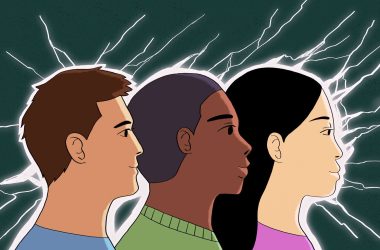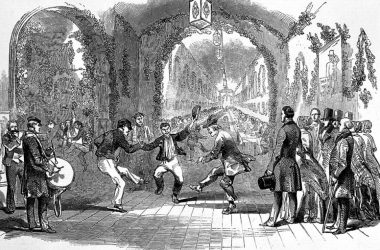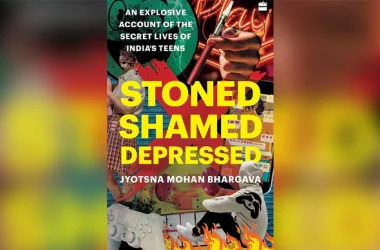Description: Two people sit at a table, in a warmly coloured room. The younger one wears earrings and writes in a book, the older one wears a sari and reads a book. The two hold hands. There is a bookshelf to the right and, behind them, an open window with plants outside. Credit: Upasana Agarwal
In 2015, I did an unusual thing — I signed up for an MA in Creative Writing. Middle aged women, especially Indian ones, don’t suddenly get up and go to England to do another degree, but on a whim, I sent off a creative piece, got admission, and I was off.
I was 47 years old and was trying to rebuild my life after a divorce, the kidnapping of my children, trauma, forced incarceration in a mental health institution, sexual violence, and much else.
The irrational decision turned out to not be so irrational after all. The Poetry module, when it came to me — although I went in dragging my feet, protesting that poetry was not for me — transformed me. I could suddenly breathe. Poetry turned into my gills.
I couldn’t put my finger upon it at the time. The research came much later, when I started propounding the use of poetry as therapy, began a charity in India, Bhor Foundation, taking poetry into asylums and prisons, and got involved in an intervention in a mental health secure facility here in England, where I am living. Indeed, I am now so convinced of the power of poetry to heal, that I speak at conferences around the world about this, encouraging other people, especially those recovering from trauma, to consider the arts, particularly poetry, as therapy.
Trauma is a strange beast. It is a heaviness in your limbs, it is an itching just under your skin where you can’t reach, it is the IBS in your gut, it is the hair falling out in handfuls. It is the grey dog sleeping at your feet which can suddenly wake up, lunge for your throat, gleaming white teeth bared. It is the cobwebs that flutter in every room of your house, and as you walk, they shimmy, reminding you of their presence.
Trauma loves to stay in parts of your body that therapy and medication can’t shift. And although I benefited greatly from my pony-tailed psychotherapist in New Delhi when I was going through the worst times of my marriage, I can truly say, it is poetry that has set me free.
I breathe differently when I am writing or even reading poetry that speaks to me. It’s as if the whole world slows down and I can finally tune into what really matters.
When I began my course, I found that I related to more contemporary poets — Warsan Shire’s work resonated with some aspects of my own life, the feeling that I was not enough, not pretty enough, not woman enough. Anne Sexton’s confessional poems gave me an insight into the heart and minds of women with feelings like mine: ‘But suicides have a special language./ Like carpenters they want to know which tools. /They never ask why build.’
Ellen Bass and Jane Hirshfield taught me to tune into the immediacy of the moment and the thrill of being able to express it with the simplest language. This was a journey I was already on with yoga and mindfulness and meditation, which has literally saved me through my darkest times. And the joy of Faiz and my current attempt to learn Urdu is a quest that is transformative and is somehow taking me closer to my Muslim grandmother, now dead and gone, except that I sense her fragrance leaning into me, holding my hand as I read.
Although we cannot think of specific poems for specific illnesses, because everyone is unique, consider that in her memoir, Black Rainbow, Rachel Kelly describes learning and repeating lines from George Herbert’s poem The Flower and the effects this simple act had on her: ‘In those moments of the day when I held hands with Herbert, the depression couldn’t find me. It felt as though the poet was embracing me from across the centuries, wrapping me in a cocoon of stillness and calm.’
There are too many poets and poems to mention, but it is a fact that at least two or more hours go by every day when I am either reading poetry, writing it, or taking part in a workshop or some other way to better my craft. It’s as if I am a child who showed up late at a party and now wants to eat the ice cream before it all melts.
But the other interesting thing that has happened with me thanks to poetry is that I have just become more relaxed and nothing, I repeat nothing, bothers me anymore! It’s as if I have finally discovered the magic mantra for life, and I am grateful for every day, every breath. Stress, worry, headaches, migraines, sleeplessness, all these have just upped and left my side, whereas before they were my constant companions.
That my work is getting recognition helps as well. My first collection of poems, Reclamation Song, was released in 2018 in India and its British edition has just been released. I used to run an online group, The Woman Inc Poetry Project, which is aimed at helping women to heal from domestic violence and trauma through the use of writing poetry. And I am in conversation with a prison to take my work into their space, helping their inmates to find their voice through poetry.
One of my poems, Button, has been performed on the BBC and found a space in an anthology which was very well received last year; it has some of the best known British voices in poetry, like Helen Mort, Kim Moore, and others, and is a response to the global #metoo movement.
Three of my anti-psychiatry poems were recently performed at a play in New Delhi which asks important questions about restraint, care and aims at reforming institutions. Small and big successes keep coming, but for me, the best reward has been the joy I have found in Nature, the peace I live with and the absolute zen that nothing can bust.
Poetry has helped me realise that this single breath we live in is home, that the body is home, and that while we have that, nothing else can really go wrong.
Delightfully, many others have found poetry as a tool to find their ground. Akkal Lama, a survivor of psychiatry, is one such inspiring voice from Nepal. He has spent decades in chains and on medication in psychiatric institutions in Nepal. He has found his way to the light through poetry.
Hear him speak about his journey below:
[English Transcription: My name is Akkal Lama. I have been working at KOSHISH since the establishment of this organization. I met Matrika Sir before KOSHISH was established. Matrika Sir has played a major role in bringing changes to my life and for who I am today.I have been suffering from a psychosocial disability since 13 years of age, which indicates that I didn’t have a normal childhood like others. I remember that I always had an interest in literature and I started writing poems from a young age. I have published five books so far. Writing poetry is life to me and I will never stop writing poem till the end of my life.
Everyone in my family, school, friends, know me as Akkal but in the literature field everyone knows me as Ishwor Thokkar. Both names are given to me by others. Initially, I used to write as Akkal. But later, I became famous with the name Ishwor Thokkar. Even my first poem was published under the name Akkal. Right now, only a few people know me as such.
There is a story behind the name Ishwor Thokkar. During my treatment in the hospital, one of the nurses working there found out that I write poems. She started to respect me and care for me a lot more since that day. One day during my discharge, she told me that she will give me a gift. I thought she will give me a pen or a diary but she gave me the name Ishwor Thokkar and from that day onwards I started writing under this name.
Regarding poems, I want to say that I have been living with a psychosocial disability for the last 18- 19 years and my experience says that medicine is not everything. Along with medicine, people should be encouraged to follow their passions, which will help them to lead their life ahead. You can even take my example; I like to write poems and this interest of mine has proven to be a great medicine for me to lead a better life.
And when I write poems, I feel calm and out of the world. It has given a life to me. I have made many friends by writing poems who love me and support me. And what I feel is that people with psychosocial disability should be introduced with their field of interest so that they can concentrate on their work and lead their life happily.
So far, I have published five books and while writing those books, I have cried as well as laughed. I concentrate so much while writing the poems that I forget everything that is going around me. Only medicine is not only responsible for what I am today but my poems have contributed more to reduce my psychosocial disability.
I want to say that I used to write poems way before meeting Matrika sir, but if I had not met him, there would have been no life for me and my poems. It is all because of him. The poems that I wrote have supported me a lot and I was encouraged by my family, society, friends, and everyone around me to write the poems. I also want to add that my life is a new life and most of the poems I write are related to mental health. I especially include things that I have been through. And in this case I remember a poem; I have a, I have a dog friendPure black, found in the temple
some days ago, only some days ago…
oh.. I forgot. Which one I should recite. If I had written and brought one here then it would have been easy. I will try to share a poem about a nurse.
I would be overwhelmed if you will keep your warm hands on my forehead for the entire life.]




